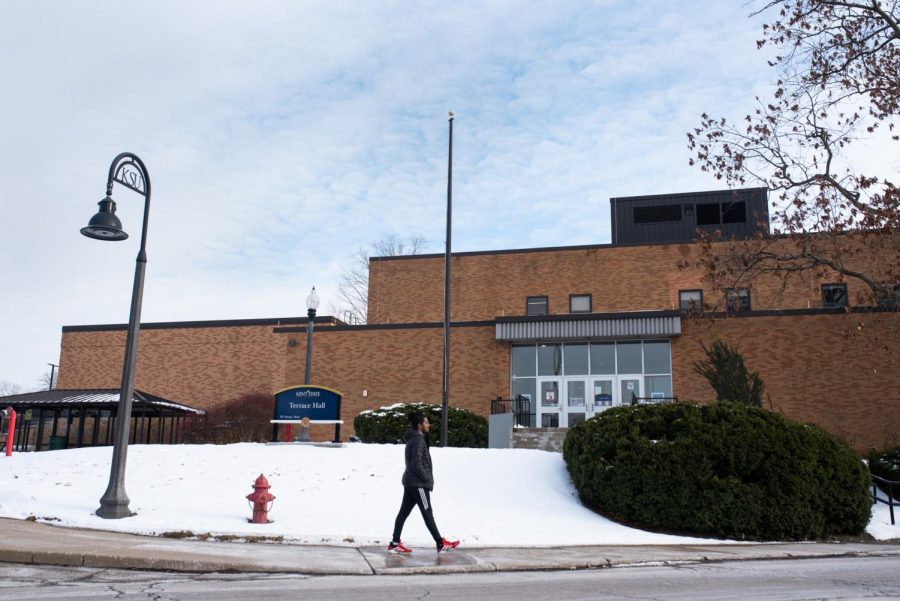Recruitment, admissions process for international students picks back up for future semesters
As one of his first acts as president, Joe Biden signed an executive order to revoke the travel ban from several Muslim countries.
Nonimmigrant students come from 120 countries to study at Kent State and revoking that order helps international recruitment efforts.
Because of the travel ban, potential students asked if they are welcomed in the U.S., said Salma Benhaida, the director of International Recruitment and Admissions.
In January 2017, the Trump administration restricted travel into the U.S. from seven refugee populated territories: Iran, Iraq, Libya, Somalia, Sudan, Syria and Yemen. While the order excluded international students, the number of international students has fallen in each of the last four years and created challenges for Kent State’s Office of Global Education to recruit new students from the prohibited areas.
Getting in as an international student wasn’t always easy, even before the Trump restrictions.
Indian-born senior accounting major Surya Suresh and his family lived in many places before calling Oman their home. He found the visa process easy when he and his family visited the U.S. for a family vacation in 2013.
But when he decided to study at Kent State in 2017, he applied for a student visa and was denied twice.
“It was [harder] because it was a very intensive check. We need to do interviews with the American Embassy back in Oman. They had intensive questions [in the] interview and not a lot of people went through the interview,” Suresh said.
After the third application, he was approved.
A few weeks before Suresh applied for the third visa, the Trump administration enacted a 90-day restriction for travel into the U.S. from the seven Middle Eastern countries.
International students were excluded from that order, but it created challenges for Kent State’s Office of Global Education to recruit new students from the prohibited areas.
“For the last couple of years we’ve been battling a lot of negative PR against the U.S. and how unwelcoming it was perceived to be,” Benhaida said.
Scrambling to support international students so their immigration status is maintained makes Benhaida’s job harder when executive orders are signed each month, she said.
In addition, that order comes as international recruitment faces pandemic-related obstacles.
International recruitment and admissions were affected due to COVID-19 before it hit the U.S.
“When China was first hit in December, our Chinese office had to start working remotely,” Benhaida said. “We had to think about solutions for our international students.”
It was helpful to experience the impact early on because the exceptions which were made for Chinese students could be replicated when the pandemic came to the U.S., Benhaida said.
All events hosted by the Global Education office are now virtual through webinars and Zoom meetings. Social media plays a major role in its process as they host live sessions on Instagram.
Counselors previously traveled to several regions during the fall and spring semesters to meet prospective students face-to-face by hosting events, such as college fairs and high school visits.
Budget cuts were another challenge the Global Education office faced.
Because international travel is prohibited during the pandemic, it has been removed from the budget. Student employment has also been cut.
Suresh worked as a student employee in the international admissions office.
“Because of COVID, everything got shut down so I couldn’t work. I lost my job,” he said. “My dad kind of started feeling heavy on the payments because he was not allowed to go to the office in Oman because of COVID, so it was rough paying rent for my apartment.”
With student employment being removed from the budget, Suresh was not rehired for the fall semester.
He applied for emergency funds available to international students. Approved students received up to $1,000, but Suresh said he only requested $500 because he felt his situation “was not as bad as many other people[’s] were.”
In 2020, the international office was awarded $30,000 in emergency grant funding for international students because of the pandemic. When the money ran out, students could then apply for the Kent State University emergency grant.
“We didn’t get the fund replenished until just a couple weeks ago, so we’re just starting the process of taking applications,” said Jef Davis, the associate director of International Student and Scholar Services.
After the budget was re-evaluated for the spring semester, student workers have been rehired for remote employment.
With the travel ban ending, a new administration in place and a vaccine for COVID-19, some believe the Office of Global Education may be able to get back to its usual operation.
“It’s [the travel ban being revoked] really a step in the right direction to make sure that the U.S. is inclusive and diverse,” Benhaida said.
Kelly Krabill covers administration. Contact her at [email protected].



